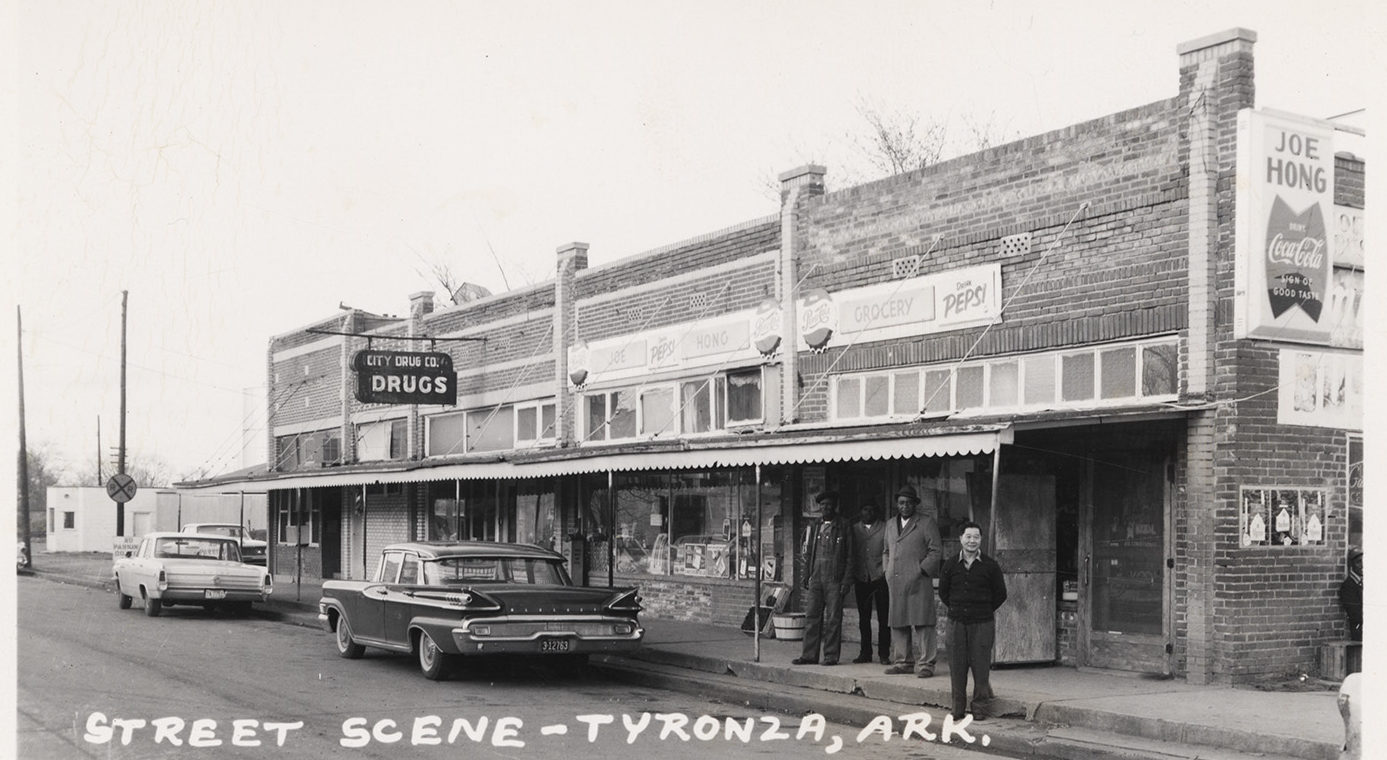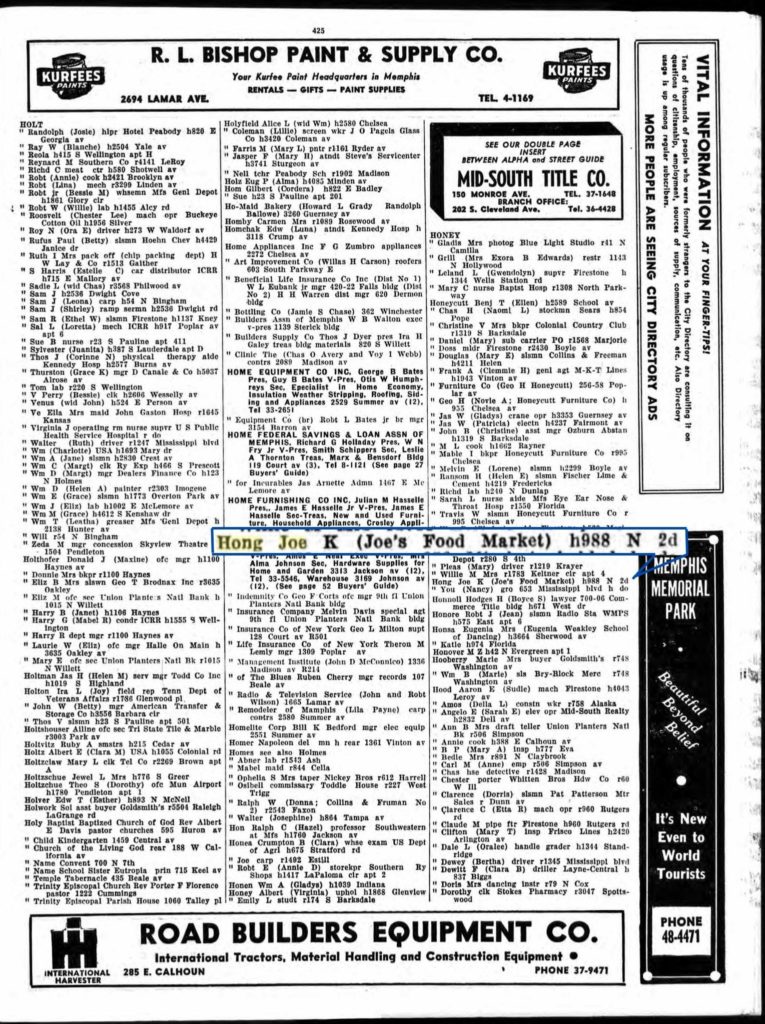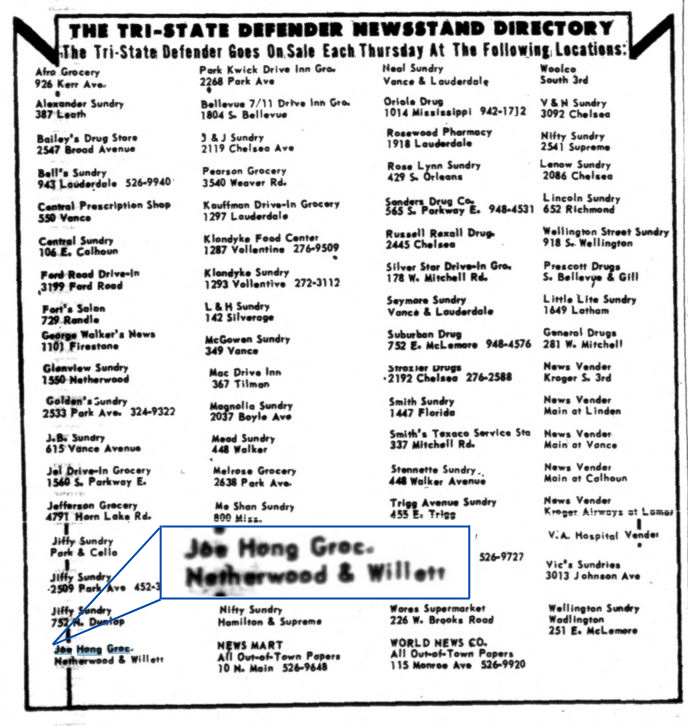calsfoundation@cals.org
The Story of a Photograph
In recognition of Asian American Pacific Islander (AAPI) Heritage Month, celebrated each year in May, CALS Roberts Library staff members Brian Robertson and Danielle Afsordeh began searching through the thousands of photographs in the CALS Butler Center for Arkansas Studies’ collections to highlight AAPI content. During that search, Robertson came across the photograph below.

In this photo from the Streetscapes photograph collection (PHO.7), we see an Asian man and three Black men standing in front of “Joe Hong Grocery” in Tyronza, Arkansas. This photo was taken circa the 1950s, given the age and condition of the vehicles as well as the clothing of those photographed.
This photo whets one’s appetite for the larger story. After Robertson shared the photo, Afsordeh began to try to find out more about Joe Hong and his grocery store in Tyronza. To someone without any contextual knowledge about Chinese immigration in the Mississippi River Valley, it might seem strange to see an Asian-owned grocery during this period in Arkansas’s history.
Through the CALS Encyclopedia of Arkansas’s entry on the Chinese in Arkansas, Afsordeh quickly found that this wasn’t strange at all. In the late nineteenth century, many Chinese immigrants arrived in Arkansas seeking both agricultural and railroad work. A large campaign to bring Chinese immigrant workers to the Mississippi River Valley was undertaken by planters from Arkansas, Mississippi, and Tennessee. By 1870, the census indicated that almost 100 Chinese immigrants were working in Arkansas’s fields. Many of the migrants were male and arrived alone to Arkansas; by 1880, only two Chinese women had immigrated to Arkansas. Many Chinese immigrants married Black women and integrated into the Black community.
By the 1920s, most Chinese immigrants in the Mississippi River Valley were in the grocery industry, like Joe Hong of Tyronza. Factors influencing this choice of profession were the closure of many of the plantation-owned commissaries that had previously provided their laborers with necessities and the exemptions for merchants that were written into the 1882 Chinese Exclusion Act that prevented most later-nineteenth-century and early-twentieth-century Chinese immigration into United States. The Exclusion Act was repealed in 1943 after grassroots organizers kept further restrictive legislation concerning Chinese migrants from proceeding through the U.S. Congress.
According to his wife Wong Lon Fong Joe’s obituary, she had come to the United States in 1936, later marrying Joe Hong and operating grocery stores with him in Tyronza, Arkansas, and Memphis, Tennessee. Through city directories, census records, and obituaries available through Ancestry.com, it was confirmed that Joe Hong did indeed live in Memphis and operate stores in Memphis and Tyronza.

Through Cindy Grisham’s book When Hope Grows Weary, we see that Joe Hong opened his first store in Tyronza in 1937 and that it primarily served the Black community. His store is noted as remaining open ten years longer than others in the community that left when the town began declining in the 1960s. He closed his grocery store in 1967, when he relocated to Memphis, two years after the train depot in Tyronza closed. He continued his relationship with the Black community in Memphis—as this ad in the Black newspaper the Tri-State Defender notes, the paper was sold at his shop.

Not much more is known about Joe Hong’s story, or what initially brought him to Arkansas, but the photo that started this journey into the past represents the experiences of many twentieth-century Chinese migrants to the Mississippi River Delta.
By Danielle Afsordeh, Community Outreach Archivist at the CALS Roberts Library/Butler Center for Arkansas Studies
(This post was first published on May 31, 2022.)




